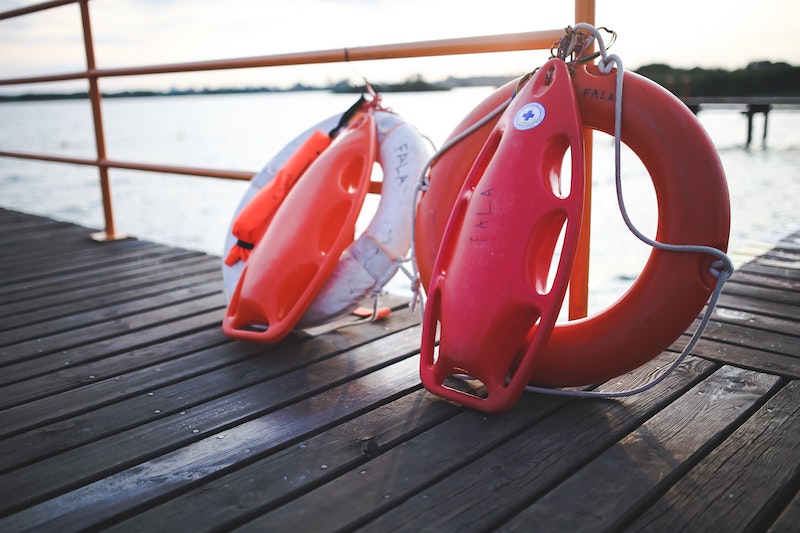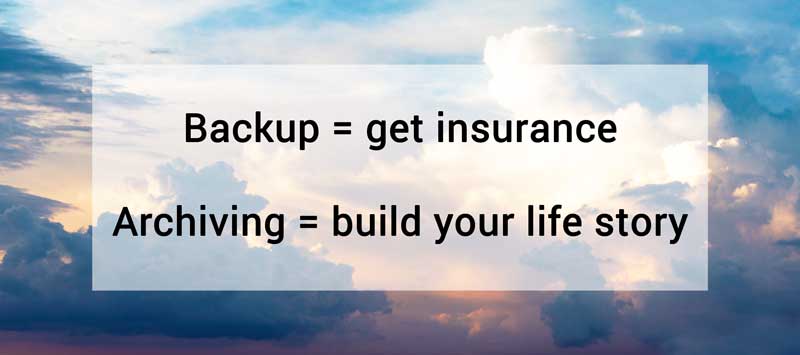
For many - especially the non tech-savvy - backup and archiving mean exactly the same thing : to copy something in case it gets lost. And they’re both an annoying constraint you’d rather not want to deal with! Actually they differ a lot and they’re both essential. Here’s why!
We get it. You don’t want to deal with the boring aspects of backup and archiving. Well, you’re not the only one:
- 20% of people have never backed up anything,
- 41% of people do it on yearly basis or less.
More than 50% of people are taking a great risk - especially knowing that more than 30% of people have endured data loss at least once in their life.
But the truth is that you must consider to backup your devices and to archive the documents and other stuff that matters. Right here, right now. Because hard drive fail. Devices get lost or damaged. Because you may delete stuff to free up space. Because of hacks and identity theft.
Backup Vs. Archive
They look alike but they’re different. They're both technical terms that means to make a copy of a digital record or file.
A Backup is a protection against a disaster. It’s a copy that is meant to be restored in case of accident, damage or loss. For instance, you may backup automatically your smartphone everyday. In the event you lose your smartphone, you may buy a new one (usually of the same brand) and easily restore all your content and apps in the new device.
An Archive is a collection of important records that is saved for the long term, classified and that is not used frequently. It is is about your identity and your legacy. For example, you may manually create an archive of your photos from 2012 to free up space on your computer. You want to keep these photos, but you don’t need to have them always at reach.

Why you need backup

Like I said, backup is like buying an insurance. You may never need to use it. But they’re no such thing as zero risk in real life. The number one advantage of backup is that is is automatic. It can be done at night for instance.
What should you backup
- Smartphone
- Laptop and other devices
- Hard drives
How often should you backup
The more often you backup, the better - especially for things that are ongoing: a paper you're writing, a project you're working on, etc. If something happens and you need to restore your data, a recent backup will limit the data loss.
How to backup
Experts recommend to have at least 2 or 3 copies of your digital stuff and documents. Two copies seems like a minimum so you need to have at least 1 backup. You have 2 main options:
Subscribe to a Backup service
It can be the one that comes with your device (Apple, Google and Windows provide these services). Or you can choose another provider of your choice, like Blackblaze or other.
Cloud backups are convenient because you may access your data from anywhere and your backup will not be held in the same place your device is (your home).
Cost: a few $ / month, depending on the storage capacity and number of devices
Create your own backup
On a hard drive, a NAS or server - like a Synology for instance. You will need to set it up on your own so you’d better know what you’re doing . Less convenient than cloud storage since you will need to manage the backup, connect your device etc.
Cost: from 25$ for a basic hard drive to a few hundred $ for a NAS or server.

Why you need archiving

When archiving, you move important content that is no longer actively used to a dedicated storage device for long-term retention. Archiving requires more efforts but can be a worthwhile process of decluttering, and the results are very interesting and more personal: in this process you will decide what’s worth keeping and you will organize it in a way that you will find it back later (selection, removing duplicates, organizing content, tagging…).
What should you archive
You should archive content that is stored on your devices and is unlikely to change : a finished document, an email conversation, a photo..... You may also consider archiving content that is stored on online third parties like your emails, WhatsApp conversations, social network posts etc.
- Photos and videos
- Important documents
- Emails, WhatsApp conversations, SMS
- Social network memories
- Blog posts…
How often should you archive
It really varies from one to another. But given the nature of the process, you shouldn’t wait too long or it will be a lot of work. You should consider to archive your content on your devices at least a few times every year or more.
Once every month, check the pictures on your phone and delete what shouldn't be kept. Once every three months, set aside an hour of your time to triage, archive or delete digital content. This will help keep things at a manageable level In the process, you should aslo check that the material you use to archive is still up and running.
When archiving online content, the good news is that a service like Kumbu can help you do it on the go - whenever you see content that you want to keep for later, you can save it in just a click. Saving you a lot of time.
How to archive
To archive properly, you will need a dedicated storage device where to store your collection of content. It can be a cloud provider, a NAS or local storage device
1. Select the content you want to archive and organize it properly - in folders, with names and ideally metadata to make it easier to find back later
2. Copy the collection on the storage device or cloud storage provider.
3. Ideally, you should make a copy of your archived content on another device / other location. Using a RAID methodology on your NAS or by manually making a second copy.

Why you need both Backup and Archiving
So, one is automatic, painless and will become a lifesaver if something happens to your device. The other may look slow and archaic: it requires effort but will lead to more quality. Simply put here’s what you get:

About Kumbu - the Souvenir Box Designed for the digital era
Kumbu is a digital safe-place designed to help you save, organize, share and enjoy your favorite content and memories from the web, social network and devices: your favorite photos, videos, Facebook posts, Tweets, emails, Instagrams, blog posts, web pages now have a home!
Kumbu Save Button
Using the Kumbu Save Button for Chrome or Firefox will allow you to save content as you surf. There’s a Facebook, an Instagram, a Tweet or an email that you want to find back later? Save it in just a click.
Kumbu Mobile
Kumbu for iOS and Android will allow you to import in Kumbu photos and videos from your gallery.
Share privately
Kumbu allows you to share your memories privately, only with the person you choose to. And you may even allow them to add their own memories to your collections for everyone to enjoy.

Data source: https://www.backblaze.com/blog/backup-awareness-survey/







